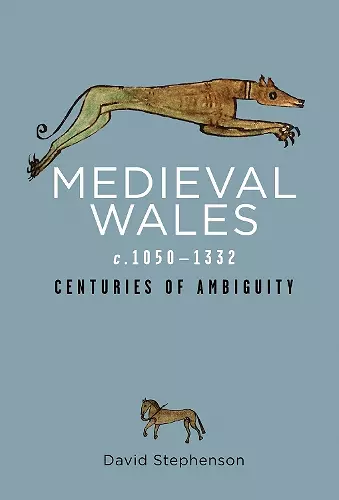Medieval Wales c.1050-1332
Centuries of Ambiguity
Format:Paperback
Publisher:University of Wales Press
Published:15th Mar '19
Should be back in stock very soon

* The book examines the latest research on Wales in these centuries. * Readers will have an introduction to the work of such scholars as Emma Cavell on the role of aristocratic women, that of Matthew F. Stevens on ethnic assimilation in medieval Welsh towns, and my own work on the strength of regional feeling and autonomy, especially in east and southern Wales, as well as work on the Welsh chronicles. * The book includes at several points detailed studies of many of the lesser-known figures responsible for the changing nature of Welsh politics in this period. Readers will be introduced to men and women not normally studied in `survey' volumes; this will, add interest for readers because of the personal elements in the book's analysis. Readers will also be helped to realize that historical change is not always determined by the `big names' but by less well publicised people. * The book challenges the simplistic view that Welsh princes of the twelfth and thirteenth centuries were always heroic figures who had the whole-hearted support of almost all Welsh people. * The book challenges the view that the Edwardian conquest brought hardship and nothing else to the people of Wales. * The terminal dates for the book are not conventional ones; 1064-1283 might be more usual. Readers will be led to reflect that all terminal dates are somewhat artificial; we can often develop fresh insights and understand historical change more effectively if we adjust the terminal dates of a book. * The book contains more emphasis than is usual on regional politics and regional differences. * Readers will be challenged to appreciate that it is not always helpful, or meaningful, to think in `national' terms; regional characteristics and loyalties are often more important.
This book examines the achievements of Welsh rulers – such as Llywelyn the Great and Llywelyn the Last in the so-called Age of the Princes – but also probes the factors, including the hostility of other Welsh leaders and communities, which led to the ultimate failure of the Llywelyns and the conquest of their principality by Edward I.After outlining conventional accounts of Wales in the High Middle Ages, this book moves to more radical approaches to its subject. Rather than discussing the emergence of the March of Wales from the usual perspective of the ‘intrusive’ marcher lords, for instance, it is considered from a Welsh standpoint explaining the lure of the March to Welsh princes and its contribution to the fall of the native principality of Wales. Analysis of the achievements of the princes of the twelfth and thirteenth centuries focuses on the paradoxical process by which increasingly sophisticated political structures and a changing political culture supported an autonomous native principality, but also facilitated eventual assimilation of much of Wales into an English ‘empire’. The Edwardian conquest is examined and it is argued that, alongside the resultant hardship and oppression suffered by many, the rising class of Welsh administrators and community leaders who were essential to the governance of Wales enjoyed an age of opportunity. This is a book that introduces the reader to the celebrated and the less well-known men and women who shaped medieval Wales.
`David Stephenson's latest book is a bold commentary on historians' writings about the political and "socio-political" history of medieval Wales over the past fifty years. A deliberate challenge to traditional interpretations, it is supported, as befits an accomplished historian of Gwynedd and Powys, by a depth of scholarship reflected in annotations and bibliographies that amount to a quarter of the book.' - Emeritus Professor Ralph A. Griffiths, Swansea University ; `This is an invaluable contribution to the historiography of medieval Wales. Stephenson successfully challenges the enduring paradigm of the Gwynedd-led evolution of one Wales, and paints a more complex, multi-dimensional picture. An essential read for scholars and students of medieval Welsh history!' Dr Emma Cavell, Swansea University
ISBN: 9781786833860
Dimensions: unknown
Weight: unknown
256 pages